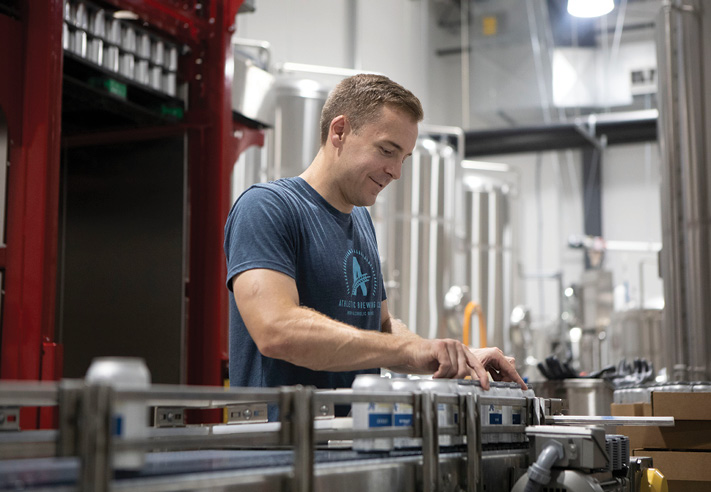Connecticut is stepping up its efforts to aid small businesses during the COVID-19 crisis with a range of loan programs and payment deferments, although canceling the property tax is probably a bridge too far.
 That was the main message during a conference call this afternoon featuring Gov. Ned Lamont, Department of Economic and Community Development Commissioner David Lehman and DECD Deputy Commissioner Glendowlyn Thames, each of whom tried to reassure the over 2,000 people who dialed in that the state government not only feels their pain, but is looking to alleviate it.
That was the main message during a conference call this afternoon featuring Gov. Ned Lamont, Department of Economic and Community Development Commissioner David Lehman and DECD Deputy Commissioner Glendowlyn Thames, each of whom tried to reassure the over 2,000 people who dialed in that the state government not only feels their pain, but is looking to alleviate it.
“We”™re in much better condition than many of our peer states,” Lamont said, referring to Connecticut”™s $200 million surplus and the $2.5 billion in its rainy day fund. “That can be depleted very quickly depending on the scale of the crisis and what the fed does, but we”™re in a relatively good position.”
As such, DECD is putting the finishing touches on a small business bridge loan program, which Lehman defined as “a bridge to when revenues start flowing again.” Terms would be 12 to 18 months at zero to 1%, he said. The program would likely be available early next week, Lehman said.
That differs from the loans being offered by the U.S. Small Business Administration, whose Economic Injury Disaster Loans offer up to $2 million in assistance over a maximum of 30 years at 2.75% to 3.75% interest.
Lamont said he is also in continuing talks with the Department of Banking to provide relief to small business owners. “I”™m encouraged,” he said. “I think you”™ll find they will be willing partners for each and every one of you over the next six months.”
“The banks have a significant amount of capital” as opposed to during the 2008-09 financial crisis, Lehman added. “They can be a big part of the solution this time.”
Controlling businesses”™ fixed costs is a priority, all three said, with Lehman noting that the state Department of Labor has already relaxed the requirements for receiving unemployment benefits. He noted that while during a typical, nonrecession era the department receives about 500 daily requests for such benefits, it received 12,000 yesterday.
In addition, the state has extended its tax filing and payment deadline to June 15. Lehman further noted that the Public Utilities Regulatory Authority (PURA) has agreed to apply its 30-day moratorium on shutoffs due to nonpayments or late payments to individuals as well as businesses.
Thames noted that Connecticut Innovations, the state’s primary business investment organization, is also offering about $50 million in bridge loans to companies already in its portfolio.
In response to a question about whether the state would be deferring taxes entirely, Lamont said he would have to take the matter up with Office of Policy and Management Secretary Melissa McCaw. Thames cast doubt on the idea by saying, “We”™d have to balance that with our budgetary needs.”
HARDLY OUT OF THE WOODS
The governor said the state could be facing “three, six, nine months of tough going,” and mentioned that “over a hundred folks are affected” ”“ presumably referring to the state”™s total number of positive COVID-19 cases. As of last night there were officially 96 confirmed cases; this morning came news that a second resident had died from the disease.
The DECD is still receiving replies to its survey of small businesses. While Lehman did not say how many responses have been received, he said that 50% of companies reported they were operating at or close to full capacity since the coronavirus crisis began, 30% had reduced output and 12% had closed.
And while the federal government has approved the $100 billion-plus Families First Coronavirus Response Act, Lamont wondered when that money ”“ and promised health care worker supplies ”“ would arrive. “I will do everything I can to backstop that at the state level,” he said.
Some hospitals have “less than a week” of mask supplies, he said. Even with the mass production of masks and other equipment, promised by President Donald Trump”™s invocation yesterday of the Defense Production Act, the governor said it “could still be a matter of months” before those supplies arrive.
Lamont said he did not anticipate closing down any other business sectors ”“ as he has with restaurants, bars, malls, hair salons and the like. When asked if he would ask manufacturers to close, he said, “Not at this point. I”™m trying to keep as much of the economy going as I can, in a safe way.”
Asked if closed restaurants would be allowed to deliver alcohol in addition to food ”“ something they are currently prohibited from doing ”“ Lehman said the state was “evaluating” the possibility.


















